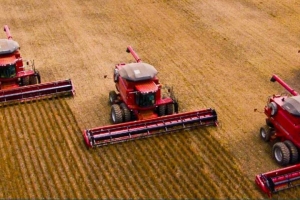


(Posted on 03/06/22)
Bunge has announced that it has exceeded its non-deforestation targets for monitoring and traceability of soybean crops from its indirect supply chain in the Brazilian Cerrado. Through the Bunge Sustainable Partnership programme, the company is now able to monitor at least 64% of indirect volumes in the priority regions, surpassing the 50% target set for 2022. In its Global Sustainability Report, the Company highlights this success which is an important achievement as company draws closer to achieving deforestation free supply chains in 2025. The Bunge Sustainable Partnership Programme is one of the many efforts that allowed Bunge to reach over 95% deforestation free soybean supply chain in the priority regions of Brazil.
“Our commitment to integrate sustainability into daily decisions we make as a company requires deep engagement with all our partners. For Bunge and the entire agriculture and food supply chains, we believe achieving real progress on non-deforestation means reaching new heights in the implementation of our approach and technology. The progress we have made in the past year is a testament to our collaborative efforts with farmers and customers and is evidence of the sustained impact we can provide,” said Greg Heckman, Bunge’s Chief Executive Officer.
The Bunge Sustainable Partnership programme, launched in 2021, was designed to help grain resellers assess suppliers’ social-environmental performance, including farm-scale satellite monitoring. Bunge was the first company to foster a large-scale effort in the Cerrado to track indirect purchases by sharing knowledge, methodologies and tools with resellers. The program is raising the standards for transparency and traceability for the indirect soy supply chain.
Bunge also launched a financial incentive mechanism, with commercial benefits for resellers as they make progress toward their suppliers’ traceability. The company will also add other incentives for participating resellers, including increased access to digital monitoring tools and data.
Bunge’s commitment to be free of deforestation and native vegetation conversion in its value chains in 2025 is a central part of the company’s business strategy and planning – and is a crucial element to its climate and emissions reduction goals. Detailed progress toward its core deforestation metrics, emissions reduction targets and other sustainability progress measures were also released today as part of Bunge’s 2022 Global Sustainability Report.
“Our business strategy is built around the growing need from our customers and partners to provide low-carbon solutions for the world. Bunge remains in a strong position to deliver as a sustainability leader and global connector for a better tomorrow,” said Rob Coviello, Bunge’s Chief Sustainability Officer and Government Affairs.
ADM and Bayer have announced a three-year extension of their partnership to support farmers in Maharashtra... Read more
The National Grain and Feed Association (NGFA) has applauded Senator Deb. Fischer’s (R-Neb.) reintroduction... Read more
Anglo American plc and Teck Resources Limited have received regulatory approval from the Government... Read more
The Rhodes Ridge Joint Venture has approved a $191 million (A$294 million) (Rio Tinto share $96 million... Read more
Trafigura Group Pte Ltd, a global leader in the commodities industry, has announced its financial results... Read more
Rio Tinto has successfully produced the first copper from the Johnson Camp mine in Arizona using its... Read more
The American Soybean Association’s World Initiative for Soy in Human Health programme and the... Read more
Karlka Nyiyaparli Aboriginal Corporation (KNAC) Registered Native Title Body Corporate and Rio Tinto... Read more
OCI Global, a leading global producer and distributor of nitrogen products has announced that it has... Read more
In December 2024, SSAB was granted a permit by the Land and Environment Court at Umeå District... Read more